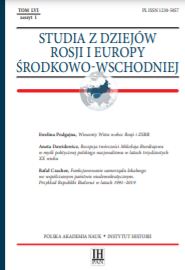Recepcja twórczości Mikołaja Bierdiajewa w myśli politycznej polskiego nacjonalizmu w latach trzydziestych XX wieku
The Reception of Nikolai Berdyaev’s Work in the Political Thought of Polish Nationalism in the 1930s
Author(s): Aneta DawidowiczSubject(s): Political Theory, Political history, Nationalism Studies, Interwar Period (1920 - 1939)
Published by: Instytut Historii im. Tadeusza Manteuffla Polskiej Akademii Nauk
Keywords: Russian philosophy; political thought; Nikolai Berdyaev; National Party; National Democracy; Polish political thought; nationalism; the idea of the ‘New Middle Ages’;
Summary/Abstract: In the 1930s, the views of Nikolai Berdyaev (1874-1948), one of the outstanding philosophers of the first half of the twentieth century, proved to be an essential ideological inspiration for Polish nationalism. Berdyaev’s ideological influence on the ideologists of the National Democracy has been barely exploited in the scientific literature to date. The idea of the ‘New Middle Ages’, popular in the interwar years, found recognition among the ideologists of Polish nationalism. The postulate of the development of the spiritual sphere making part of the National Party’s manifestos was included in the ‘New Middle Ages’ concept. According to national ideologists, the idea of ‘New Middle Ages’, based on the Catholic faith and the principles of Roman civilization, was the negation and contradiction of the sixteenth-century ‘humanism’, the ‘achievements of the Reformation’, the eighteenth-century Enlightenment, the ideals of the Great French Revolution, nineteenth-century materialism, liberalism, socialism, communism, and scepticism. In the second half of the 1930s, by rejecting the model of liberal democracy, some of the young generation’s right-wing activists distanced themselves from the prospects of a dictatorship based on the rule of the national elite. As a result, space opened up for developing visions that referred - in various extents - to authentic political patterns. An order different from both democracy and dictatorship was sought. Significant in this context was the fascination with the Middle Ages, when social life was built within the class structures. Among the research techniques used in the paper, the analysis of testimonials of political thought and traces of political thought comes to the fore. Other research methods useful for the implementation of the paper topic include systematization of political concepts and description arising from the analysis of reality.
Journal: Studia z Dziejów Rosji i Europy Środkowo-Wschodniej
- Issue Year: 56/2021
- Issue No: 1
- Page Range: 47-68
- Page Count: 22
- Language: Polish

